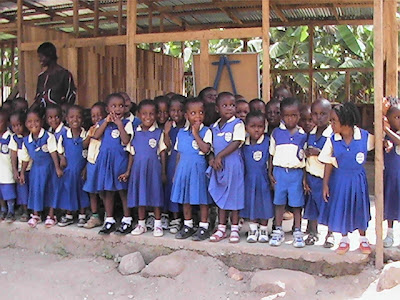Tror Na Foe (troh-nah-fway) - a phrase in Ewe, the language of my father's ancestors from the southeastern portion of Ghana's Volta region. Roughly, it means "to return and find again".
 photo : a girl and her mother prepare to take center stage during a break in their tradtional Ewe dance troupe's performance in Anloga at the Hogbetsotso Festival, November, 2006.
photo : a girl and her mother prepare to take center stage during a break in their tradtional Ewe dance troupe's performance in Anloga at the Hogbetsotso Festival, November, 2006.
Note: Once again, I extend a warm welcome to all those readers who may be new to this site. If you are one of these, I invite you to settle back and spend a little time catching up with where we are now by scrolling all the way down to the first installment and reading your way back up. If you don't have time right now, I'm glad you've joined us anyway - just know that this is entry number 8 in a story that has been unfolding since earlier this year, and eventually, you might want to go back to the first few installments to see where and how it all began. Welcome!
After an enjoyable and mostly relaxing Thanksgiving week-end, I slowed down my pace even more for a couple of days, just to finish recovering from jet lag. As I write this, I have to admit I'm still not completely recovered. But I can feel myself bouncing back... and not a minute too soon! The holidays are here, with all the hustle and bustle that entails.
I may not be as regular with the blog as I have been until we arrive at the new year, but rest assured, I'll still be posting new installments, so do keep checking in. The number of days from now until Christmas is quickly slipping away, and like many of you, I've got to take some time now to deal with preparations for the season. And suddenly, there's more to do this year than usual. This recent trip to Ghana and the gift of all this new-found family means our Christmas card list just grew by about 40%!
Parsing Out The Story of That First Ancestor
When my wife Celeste and I had our first meeting with Lawrence Agbemabiese, the cousin with whom I made that preliminary contact, before he said almost anything else, he apologized for slavery. It clearly wasn't something he'd planned to say. Our first meeting was an emotional moment, and I think, suddenly face to face with a long-missing relative whose ancestors had been victimized by the slave trade, the enormity of the realization that some of his ancestors may well have been involved in these crimes hit him right between the eyes.
The next time we talked, the conversation kept coming back to two things: 1) what a wonderful, unexpected and near-miraculous thing it was to hear from a long-missing African American relative out of the blue; 2) how strange it is that a member of their family of heriditary chiefs could have ended up being taken as a slave. The unspoken subtext of this conversation could be summarized as, "People from our social strata didn't often get sold; we were the ones who did the selling!" That's a touchy and awkward place from which to begin developing a relationship and unraveling a complex family history... but it wasn't for nothing that slavery was called, "the peculiar institution!"
Right before I left Ghana, Lawrence and I had a lengthy conversation on the phone about what our next steps should be, in terms of striving to reach that much longed-for "Kunte Kinte moment" that will identify for us who that first African ancestor of mine was, and unravel the story of how he came to be a slave.
Our new-found Ghanaian relatives told us that during the latter chapters of the dark days of slavery, many Ewe were, indeed, heavily involved in both slave trading and gun running, cozying up, when it seemed most expedient to their survival, to either their neighbors, the powerful Ashanti empire, or to the British. We had read some of that history too. But we had also learned that earlier on, from the mid 1600's until the mid-1700's, many, many Ewe were taken as slaves.
In addition, I knew from the family lore of my English ancestors in Virginia that they had started buying slaves in the 1660's. And it just so happens that the 1660's were a catastrophic decade for the Anlo-Ewe people - the beginning of a period that saw many of them sold away to the New World. There were costly wars with their Ga neighbors, among others, to the west, as well as with the kingdom of Dahomey and the Oyo empire to the east.
The decision to engage in warfare was a very difficult and weighty matter for the Anlo-Ewe. There was, on the one hand, an ancient and proud warrior tradition, balanced on the other by a powerful belief in the sacredness of human life. That belief is so strong that the Ewe also have an ancient tradition the militaries of the world would do well to study and copy today. After a war was concluded, all veterans were required to move together into a special encampment - a soldiers' village - that was maintained for the exclusive purpose of helping soldiers "decompress" and heal from the stresses and horrors of battle for a time before they were allowed to return to their families and normal life.
The core idea was that being forced into a situation in which one had to break the ultimate taboo - the taking of human life - was so devastating to his immortal soul that he needed to be in a setting where he and the others with whom he had marched in battle could now be prayed over together, and forgiven, as well as publicly thanked for their sacrifice. One has to wonder how much emotional and spiritual suffering might be avoided among veterans and their families around the world if such comprehensive "re-entry" programs existed elsewhere(not to mention such a powerful reluctance to engage in war in the first place)!
Given this aversion to killing, whenever faced with the expansionist drive of aggressive neighbors, the Anlo-Ewe had always preferred the passive path of migration to meeting fire with fire, but by the early 1600's - just in time for the slave trade to start heating up - they found themselves with their backs to the sea; one set of powerful enemies to the east; another to the west. The military leaders who stepped up to the challenge received the full support of the people, and before long, the Anlo-Ewe had pushed back their enemies from the Ga country, Dahomey and Oyo, firming up their hold on the territory east of the Volta River that is still the heart of their homeland today.
Fighting back and winning felt good. And within a very short time, the clans which produced the generals and the chiefs who had carried the day against their enemies became the most powerful and prominent families in the culture. With their rise to prominence, worship of their patron deity, the god of war, began to supplant the ancient worship of the matriarchal deities who had ensured good crops and a blessed home life.

Good work has been done in west Africa by Dr. Kittles and others but, given the limitations placed on that work by funding, the geneaological sampling that's been done has been carried out on diverse groups of people. The end result is that someone of African descent here in the North or South American diaspora might be able to identify an ethnicity and/or a region that has a high probability of being the point of origin for at least one family line. But as anyone who knows who has looked at the statistics regarding who's part of the large and growing database at "Y-Search" or "Mito-Search," the number of individual Africans and people of African descent who have participated so far is very small. Tiny.
While I was in Ghana last month, Gideon and I did a lot of talking about what a great thing it could be if more individual west Africans were to be sampled and have their results uploaded into a database. Our discussions are still very preliminary, and the project idea is extremely ambitious. After all, at a ballpark price of $100 per test, it would cost $1,000,000 just to get 10,000 people tested! But we are determined to help this idea grow. Stay tuned! We have already met with Ghana's Minister of Health to "pitch" this idea, and we had a great interview on JOY 97, Ghana's most listened-to radio station. People see clearly how such a thing would be a "win/win" for Ghanaians and African Americans both. We're going to keep on pushing this idea, and we'll be letting you know how it goes... as well as how you can help!
An Appeal for Sky Limit School
Once again, I remind readers that Cousin Lawrencia Agbenyefia runs a primary school near Kumasi (see photo above). I carried some supplies to her in November, but you know how restrictive the airline luggage allowances are these days. So, I'd like to enlist your aid on her (and the childrens') behalf. They need math and science texts and workbooks, appropriate for the early elementary grades; educational games, toys and puzzles; age appropriate books for the library; computer CDs and DVDs; etc. Lightly used items will be fine, but brand new is ideal. If you can help, you may send items or checks to her in care of her church at:
Mrs. Lawrencia Agbenyefia
P.O. Box 539
Obuasi, Ashanti Region,
Ghana





3 comments:
This is a fasinating story. I have bookmarked your blog and will return often.
Ed
I found your blog from the comment you left on karoda's blog. Thanks! I read back through your posts -- what an inspirational story. I am white and my husband is black. He does not know much about his ancestry and his Mom is very vague in what she shares -- I'm guessing she doesn't know a lot either. I'd really like our 5 year old son to grow up knowing as much about his black ancestry as he'll know about his european ancestry from my side of the family. I will definitely order a dna kit from national geographic for my husband! thank you for sharing.
This is just the beginning .Please keep us informed.
Hemlo
Post a Comment